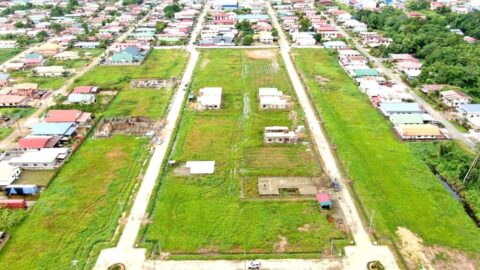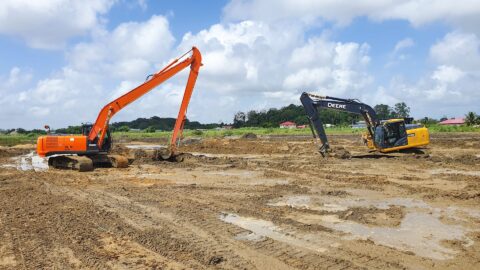The largest real estate trader – the State of Suriname.
As of 2017, Terzol Vastgoed NV offers integral services in the areas of purchase and sales brokerage, purchase and rental, appraisals, property management, subdivision, project development and consultancy to national and international, corporate and private clients in Suriname. Terzol Vastgoed NV intends to publish a series of articles under the name ‘Grondzaken Nader Belicht’ in the coming period, with the following goal: to create or increase the awareness of all stakeholders – including brokers, developers, investors, landowners, buyers, sellers and government – about the various possibilities and legal certainties regarding land matters in Suriname.
Joël Terzol, Senior partner and CEO of Terzol Vastgoed NV, started out as a financial professional in the Netherlands and developed into an ambitious and successful entrepreneur in the real estate market in Suriname. Although buying and selling real estate runs in his blood, he has developed a passion for advising on all kinds of issues related to ground lease, ground rent and estate matters within the real estate market. In addition, Terzol anticipates the major developments in the Gold, Oil & Gas Industries in Suriname by developing projects in innovative ways to meet the modern needs of expatriates.
Terzol will cover the following topics in the series of articles, namely:
- Domain land
- Land tax
- Land Policy
- Estate matters
- Ground conversion
- Apartment Law
Domain land
Suriname has natural resources such as gold, oil and bauxite and, as the greenest country in the world, also has a huge forest cover; i.e., our country has various resources both below and above ground.
But what is the current status and market value of Suriname’s territory?
Our country has a diverse system of legal titles to land, namely:
- Ground rent (after 1982)
- Allodial ownership and hereditary possession
- BW ownership
- Leasehold (until 1982)
Right of Ground Lease
Although some of you may believe that you have purchased a piece of land and “own” it, you may be seriously disappointed if you can legally claim only the limited lesser right of ground lease.
It should be clear that the right of ground rent offers less legal security compared to ownership.
How exactly does ground rent work?
Ground rent works just like renting a residential property, where you make arrangements with the homeowner.
You can compare the State to the homeowner “renting out” the plot and yourself to the tenant.
I. When renting a residential property, with respect to the rent, it is agreed how much and when you are to pay the rents per month. In the case of ground rent, pursuant to article 14 paragraph 2 DUD, the State gives you a plot to rent for a certain period of time under the condition of payment of an annual ground rent fee or canon. The canon you pay can be compared to the rent you pay when renting a residential property.
II. It may be agreed that the leasehold is to be used only as a residence. The land lease ordinance may have provided that pursuant to Article 32 (1b) DUD, the parcel of land ceded in land lease may not be used for any other purpose, other than for which it was ceded.
III. The ground lease agreement will agree the conditions under which the agreement may be terminated or extended. The ground lease agreement may state that if you have failed to pay the ground lease fee for three consecutive years pursuant to Section 32(1c) DUD, the ground lease right may be declared void.
Property vs Ground Lease
Property right (Art. 625 BW) also called ‘full ownership’ is the right to have free enjoyment of a thing and to dispose of it in the fullest manner, provided that one does not make use of it contrary to the laws, established by such power, which, according to the Suriname State Organization Act, has the authority to do so, and provided that one does not cause hindrance to the rights of others; all subject to the expropriation for general benefit against prior compensation, pursuant to the Suriname State Organization Act.
It is the strongest right in rem.
Article 14 of the Decree Issuing Domain Land (DUD) defines ground lease as a right in rem to have the enjoyment of a piece of domain land, subject to the obligation to use this land in accordance with the destination and provisions given by the State.
When you are granted this limited right in rem, you can transfer this right but also encumber the leased plot with a mortgage (art. 18 paragraph 2 DUD).
Thus, you are restricted to use the land for the purpose for which the State has issued Suriname the land lease right; therefore, pursuant to Article 25 DUD, you are subject to some obligations and conditions that you do not have with the property right.
It is important to realize that when a portion of the State’s land is subject to the right of ground lease, the State of Suriname remains bare owner. You, as a land tenant, have only the limited right in rem. This right is not as strong as the full ownership right.
Beginning in 1982, the State issues parcels of land on which the right to ground rent rests for a minimum of 15 years and a maximum of 40 years. Ground rent is attached to a term for which it is issued and thus has an expiration date. From this we can also infer that the right of ground rent has a diminishing value character. In principle, when the term of ground rent expires, the value also decreases. Compare it to a can of brown beans you buy at the supermarket. As the expiration date approaches, the shopkeeper will want to sell it for less so that he is not left with a dilapidated can that is not saleable. It works the same way with ground leases. An expired ground lease right cannot be sold.
Restrictions on the right of Ground Rent
1) Duration of land lease right
You, as a land tenant if you want to secure your interests, will have to take actions to preserve the right and, according to the law – but seriously considering the disproportionately long waiting period for the land application to be processed by the ministry – will have to submit a written request to the Minister of Land Policy and Forestry (GBB) no later than six months before the expiration date. This obligation is not there with the property right and because it has no expiration date, it will remain stable in value.
2) Inheritability of land lease right
Ground rent is inheritable, but in the case of multiple heirs, only for a period of 18 months after the opening of the estate (Article 16 DUD). I.e., if the ground renter dies, the heirs must indicate within 18 months to which heir the right of ground rent is transferred. If there is force majeure, the 18-month period is suspended by 12 months starting from the day of the opening of the estate (art. 17 DUD). Thereby, the right of ground rent is inheritable for a maximum of 30 months. If the heirs take no action, the right of ground rent expires by operation of law and reverts to the bosom of the State, free of mortgages and encumbrances.
This has far-reaching consequences. The legislature sought to prevent estate formation with this law. On the other hand, the right of ownership has no time limit and is eternally inheritable. Besides the far-reaching consequences for the heirs, there may also be consequences for the mortgage lender such as the bank (Art. 18 para. 2 DUD). If the land lease right returns to the bosom of the State by operation of law, the mortgages are also cancelled. The mortgage lender may suddenly run out of mortgage coverage and will demand the outstanding balance immediately.
Terzol’s advice to the banks is to make any mortgage financing where ground rent is offered as collateral also conditional on the ground renter taking out life insurance. However, risk insurance carries a considerable monthly premium. With ownership, the mortgage lender does not run the risk of the right lapsing so easily. Also, in case of legal separation, dissolution of a legal entity or other way where there are heirs, the State is given the possibility to return the right of ground rent to its bosom (Article 16 DUD). Worth mentioning is the court ruling in the case Kasi ca the State of Suriname (Kr. d.d. 5-1- 2012 AR 110347) in which the district judge ruled that the right of ground rent had lapsed by operation of law after 18 months. Since the new land tenant had invoked Article 16(1) DUD, an existing applicable article of law, an appeal on this could not be passed. Terzol emphasized that although the heirs argued that said article of law is actually a “dead letter” – i.e., that this provision is neither observed nor enforceable – it is in full force and effect to this day, given this court ruling. The rationale of this decree, prevention of estate formation, was again emphasized.
3) Article 24 DUD vs. Expropriation
The land tenant is obliged to cede at all times such a portion of the land for general use as the State may require for the construction of public roads or canals with the associated engineering works and utilities, without being able to claim any compensation for the loss of his enjoyment, unless the efficient exercise of the purpose for which the right has been granted is unreasonably impeded or exceeds 1/4 of the land, without prejudice to his right to compensation for the damage caused by the earthwork to business and to buildings, plantations or other betters (art. 24 DUD). The right of ownership is considerably stronger and expropriation will always involve compensation and a longer procedure to be followed by the State. Although it is believed that it is not possible, the Expropriation Act of 1904 provides sufficient guidance for this purpose. This law is supported by the Expropriation of Urban Development and Housing Facilities Act 1948 (OSoW Act).
A first difference between the Expropriation Act 1904 and the OSoW Act is that the latter describes three purposes for a simpler procedure. Mr. Carlo Jadnanansing, in his Speech ‘Return to the bosom of the State’ on the occasion of accepting the Honorary Doctorate granted by ADEK, refers to this that “those purposes are considered so weighty for the community that they do not need to be declared of public benefit by law.” The purposes of expropriation listed in the OSoW Act are pursuant to Article 1 Oso W:
- for the purpose of implementing or maintaining the actual condition in accordance with a zoning ordinance
- t.b.v. areas in interest of housing facilities;
- for the purpose of a building plan to be implemented in the interest of housing supply.
The second difference between the two laws is that under the OSoW Act, compensation does not have to be paid in advance. The expropriation title may be entered in the registers at M.I. Gliskantore immediately after the offer.
Ministry of GBB
The Ministry of GBB manages all the State’s land and must ensure that, among other things, the canon revenues are paid; in addition, this ministry must realize that it manages Suriname’s largest real estate portfolio with which the State should generate income. Terzol advises the Ministry of GBB for stricter compliance with the above laws and regulations, namely checking whether the land tenant complies with legal provisions and the conditions in the decision. He further indicates that there is ample room for improvement in service delivery as well as the view in which the land can be managed. Next, Terzol is curious if the minister knows what land belongs to the State and what arrears of canon payments there are.
In short, does the Minister have all the information that will allow unused land to return to the bosom of the State and be redeveloped so that an economic contribution can be made to the development of our country? Land speculators, however, who neither utilize domain lands nor pay taxes and canon, are holding up the development of Suriname and thereby – because of the shortage of building lots – driving up land prices.
Land valuation
The clapper value, i.e. the minimum value for transfer of plots, and the large shortage of building plots can cause the value of ground rent to be distorted. The demand for good building plots is high and the clapper value does not take into account the difference between ground rent and ownership plots. Also, the values have been fixed in foreign currency for years. By doing so, the government indicates that both land titles have equal values and also encourages the sale of real estate in foreign currency. Land is thus overvalued, resulting in high transfer costs and landowners being caught off guard when having their plot land appraised. The value based on the clapper value is often higher than the fair value. Assuming that the clapper value is the minimum land value for which it is traded, the landowner is counting on an even higher yield. In some cases, it can be substantiated that the land lease right is worth more through betership than a similarly owned lot in the same area. For example, if the land tenant has elevated and improved his site to such an extent, adding value to it. Some innovative allotment developers in North Paramaribo are an example of this.
Ground Chamber
The Land Chamber was established by Decree Land Chamber of 1982 but not made operational until today. An important task of the Land Chamber is to protect the private interests of the land user, both from the State and private landowners. See here the clean task for the Minister of GBB to urgently install the Land Chamber.
Introduction of Land Tax
The legislature has stated that land should be considered a common heritage of the people and should therefore be exploited, protected and managed in the most efficient manner. Terzol favors the introduction of land tax for all land users, as it aims to effectively promote land development in Suriname. The land tax article will discuss this issue in more detail.
Ground tenant do you know that …
- you rent a piece of domain land from the State and therefore must comply with the legal provisions and conditions set forth in the order?
- the State does not always implement the law and this has legal consequences for the beneficiaries and the lender?
- the absolute right of ownership provides more legal security, than the limited right in rem of ground rent?
Are you ready to convert your land lease right to ownership?
Summary
The State has the right of ownership or “full ownership” of lands belonging to the State domain and remains bare owner of all issued lands in Suriname. As a land tenant, you are restricted to use the land for the purpose for which the State of Suriname has issued the right of land lease; therefore, pursuant to Article 25 DUD, you are subject to some obligations and conditions – such as the land lease fee, destination of the land lease and possibilities whereby the right of land lease can be cancelled – that you do not have with the right of ownership.
Therefore, ground rent vs. ownership has some limitations, such as:
- Expiration of term of land lease right;
- Inheritability of ground rent within the term of minimum 18 and maximum 30 months;
- Article 24 DUD (without compensation) vs Expropriation (with compensation).
In the context of ensuring legal certainty with respect to land matters, it is essential that the State, as the largest real estate trader, implements and complies with the rules of the Act. This applies in particular to land valuation, where the State, in view of the shortage of building plots and the high demand, unjustifiably does not take into account the difference between land lease and ownership plots. For a piece of legal protection of the land tenant, installing the Land Chamber is a requirement. The land of our beloved Suriname should be considered a common heritage of the people and should therefore be exploited, protected and managed in the most efficient manner!















